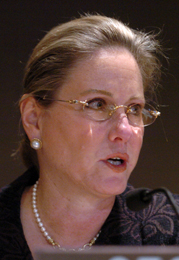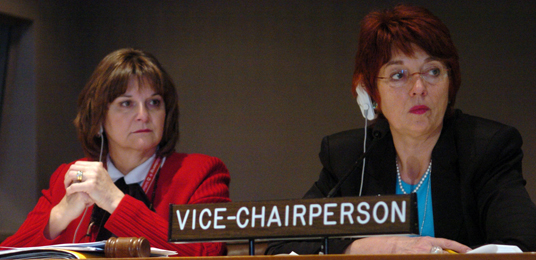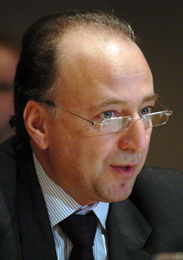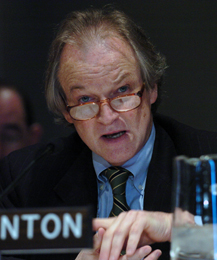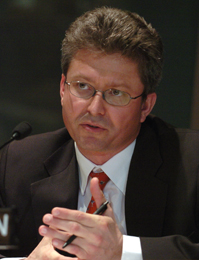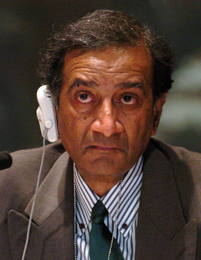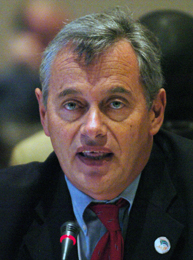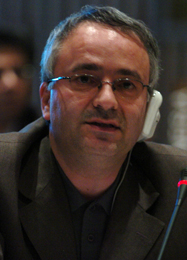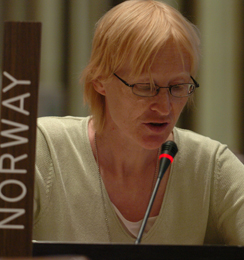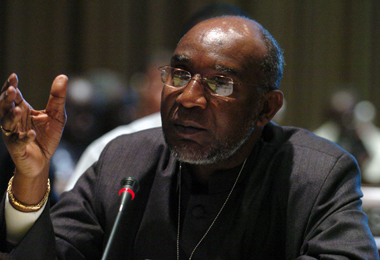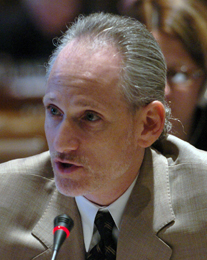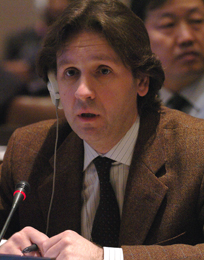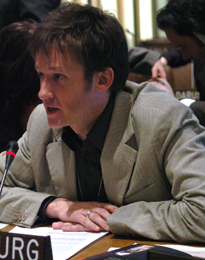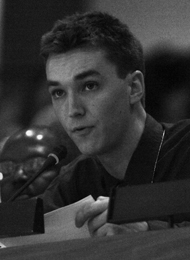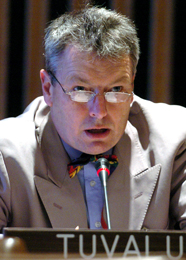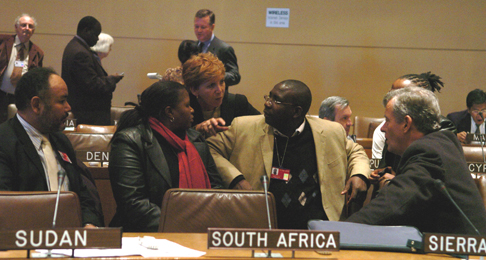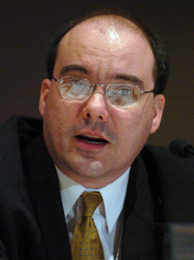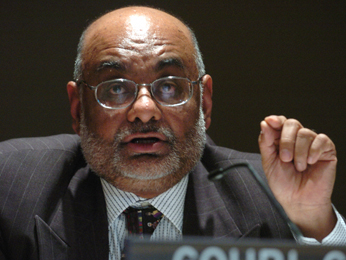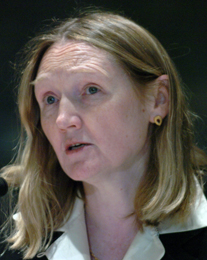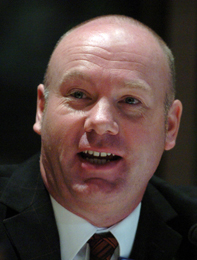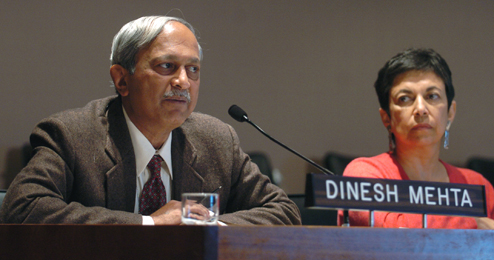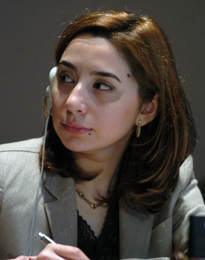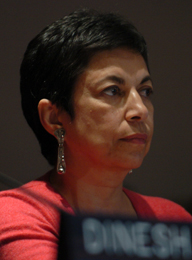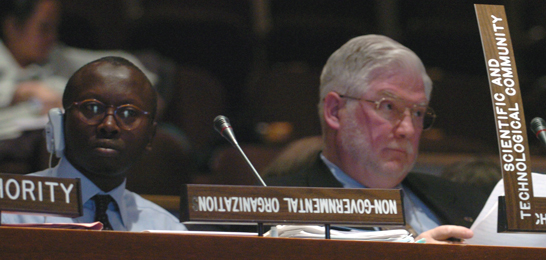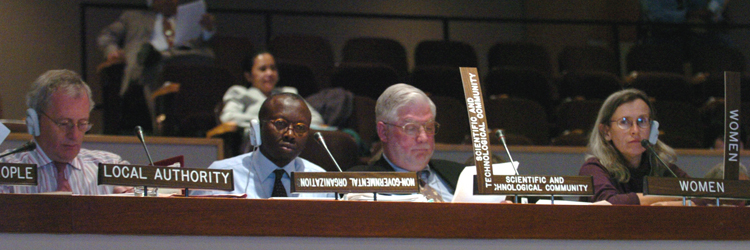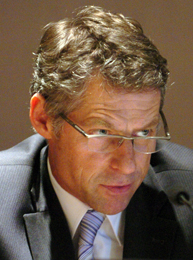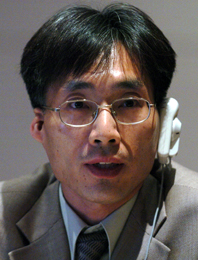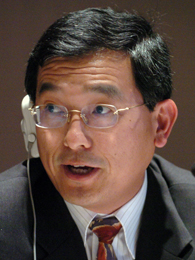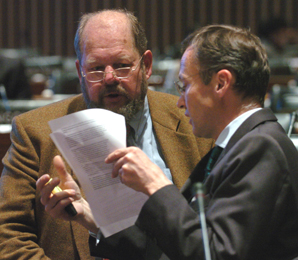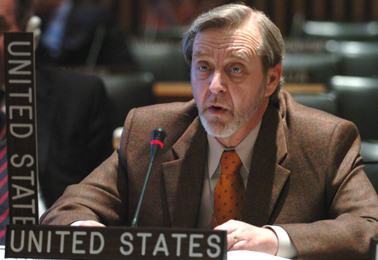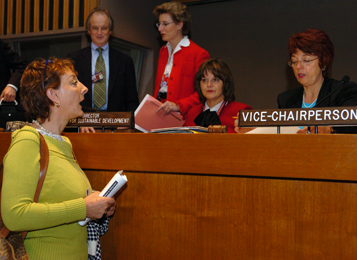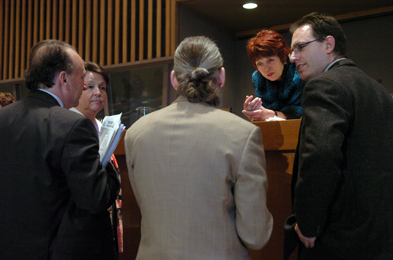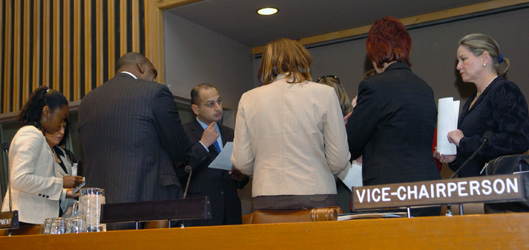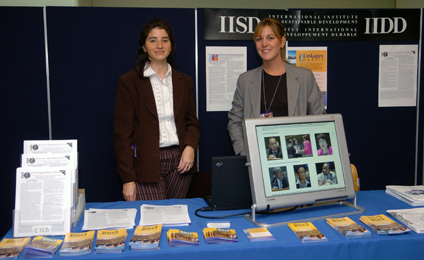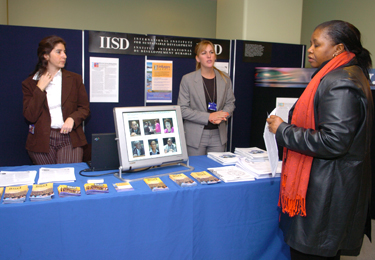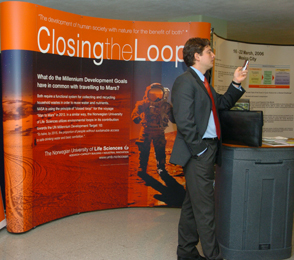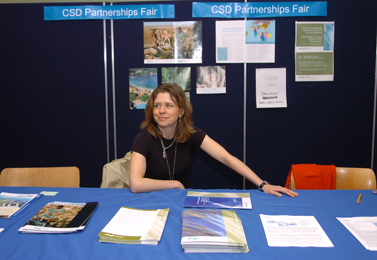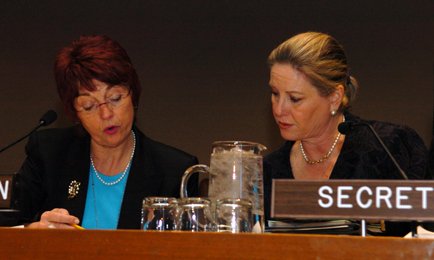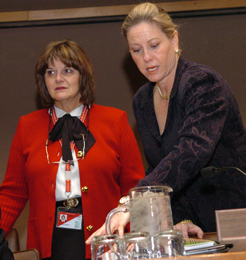|
Highlights from Tuesday, 12 April
Delegates met in two parallel sessions to engage in interactive discussions on water, sanitation, and human settlements. One group dealt with water and sanitation issues, including Integrated Water Resource Management (IWRM), access to basic water services, access to basic sanitation and hygiene, and wastewater treatment, recycling and reuse. The other group considered human settlements, focusing on access to housing and public services, job creation and enterprise promotion. The discussions on each topic were led by a panel of representatives from UN agencies and other organizations.
Interactive Discussions on IWRM and Access to Basic Water Services |
| |
|
| |
|
Joackim Harlin, UNDP, Robert Lenton, Global Water Partnership, JoAnne DiSano, Director, Division for Sustainable Development, and CSD Vice-Chair Dagmara Berbalk
|
| |
|
| Vivien Pliner-Joseph, Secretary of the CSD (left) and JoAnne DiSano, Director, Division for Sustainable Development, and CSD Vice-Chair Dagmara Berbalk |
| |
|
Jamal Saghir, World Bank, focused on financing issues, including charges for water services and subsidizing the poor. He also noted the challenge of decentralization and governance, and emphasized the increasing role of the local private sector.
Robert Lenton, Global Water Partnership, emphasized IWRM's importance in attaining the MDGs. He noted the catalyzing role of the 2005 target for IWRM plans, as well as concerns regarding the declining resources allocated to water issues.
Joakim Harlin, UNDP, emphasized the need to empower local actors, create incentives to support decentralization, and link IWRM and infrastructure development. He suggested developing a practitioners' guide to operationalize agreed policy options. |
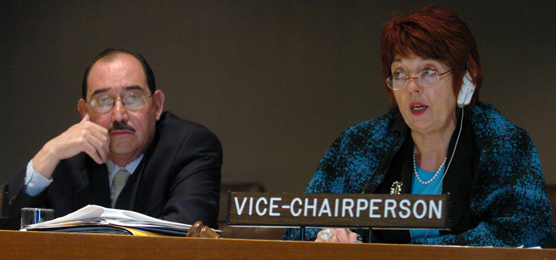 |
|
Manuel Dengo, Division for Sustainable Development, and CSD Vice-Chair Dagmara Berbalk (left)
Ravi Narayan, WaterAid, stressed the importance of more and better financing on water and sanitation, effective governance, community participation, accountability and authentic and accessible information in attaining the MDGs.
|
|
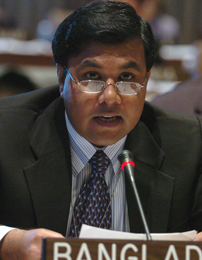 |
|
|
|
Abdul Alim, Bangladesh, said that water is "a matter of life and death" for his country. Mike Muller, South Africa, and Jarad Amin-Mansour, Iran, endorsed a rights-based approach on access to basic water services. |
|
|
| |
Mari Saether, Norway (left); Byron Blake, Jamaica, speaking for the G-77/China, underscored the need to apply IWRM in a country-specific manner, noted that many countries will not meet the 2005 IWRM planned deadline because of lack of financial resources, and discussed the need for access to technology on preferential terms; and Aaron Salzburg, US State Department, stressed the need to focus on practical results as a product of CSD-13. |
| |
|
| |
Oleg Shamanov, the Russian Federation (left), highlighted environmental and social aspects of water with due regard to specific conditions of countries.
Luxembourg, for the EU,
suggested linking IWRM with broader development plans, decentralizing to the lowest appropriate level and coordinating MDGs and IWRM implementation monitoring.
Wyatt Matthews, Youth and Children representative, encouraged inclusion of youth represenatives on government delegations, and encouraged the incorporation of water issues into the curriculum and the recognition of the right to water.
|
| |
Ian Fry, Tuvalu, called for the establishment of a funding facility for LDCs and SIDS and for an implementation review on water actions relevant to SIDS (left); and South African delegates consulting before the convening of the afternoon session
|
| Interactive Discussions on: Access to Basic Sanitation and Hygiene; and Wastewater Treatment, Recycling and Reuse |
| |
|
| Vanessa Tobin, UNICEF, Ede Ijjasz, World Bank, and Veerle Vanderwerd, UNEP |
| |
|
| |
Ede Ijjasz, World Bank, emphasized institutional and coordination challenges in sanitation, stakeholder involvement, the need for clear regulations and affordable options, interaction between households and authorities, and the importance of behavioral change.
Gouri Ghosh,
Water Supply and Sanitation Collaborative Council, called for a “paradigm shift” in sanitation, and focused on concrete collaborative actions and tools to be used for improving sanitation services. He stressed the importance of community-driven initiatives and building coalitions between governments and stakeholders.
Vanessa Tobin, UNICEF, suggested prioritizing sanitation, decentralizing and supporting community-led initiatives, targeting school and health facilities, involving all stakeholders, and improving the role of UN agencies. |
| |
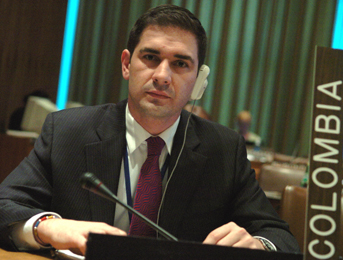 |
|
| |
Jorge Hernan Betancur, Colombia; On water services, Colombia suggested decentralizing water services to the local authority level.
Jamie Bartram, World Health Organization (right), discussed the adverse impacts of wastewater mismanagement, the need for information to support evidence-based policymaking and strengthening regional processes and coordination. |
|
| Interactive Discussions on: Access to Housing and Public Services; and Job Creation and Enterprise Promotion |
| |
|
| |
| Dinesh Mehta, UN-HABITAT, highlighted the lack of access that the urban poor have to domestic capital markets. He explained that recent experiences with UN-HABITAT's Slum Upgrading Facility suggest that small amounts of international financing can be used to leverage much larger amounts of domestic capital.
CSD Vice-Chair
Husniyya Mammadova,
Azerbaijan (right) , chaired the session.
|
| |
|
| |
Nefise Bazoglu, UN-HABITAT (left), explained that the international target of improving the lives of 100 million slum dwellers was established when there were no accurate assessments of slum dwellers' population and trends, adding that this population was now estimated at one billion. A representative of the NGOs (center) said that the goal
of achieving significant improvement in the lives of at least 100 million slum dwellers by 2020
should be changed to “reducing by half” the number of urban slum dwellers by 2020. A representative of the Scientific and Technological Community (right) spoke of the importance of including social scientists in the development, implementation and evaluation of urban development efforts. |
| |
|
| |
Representatives of Major Groups during the interactive discussion on access to housing and public services
|
| |
|
|
Kees van der Ree, International Labour Organization, commented on policy options and measures contained in the Chair's IPM summary and proposed some practical actions. He discussed the use of infrastructure investment for job creation and enterprise development, laws and regulatory frameworks and assistance to small enterprises, job creation for women and youth, and the development of an entrepreneurial culture. The Republic of Korea
recommended an international credit fund for housing finance to give developing countries access to resources in an international market.
CSD-13 Vice Chair
Boo Nam Shin chaired the session |
| |
|
| Belgium discussed an innovative multilateral effort focused on support directly to municipal authorities and which included city-to-city cooperative efforts; and the US highlighted the needs of young people and women, citing examples of successful and replicable multi-stakeholder initiatives. . |
|
| Miscellaneous Photos |
| |
|
| |
|
| |
|
| |
| Marcela Rojo and Ivy Marvin at the IISD booth (enb.iisd.org) |
| |
|
|
|



